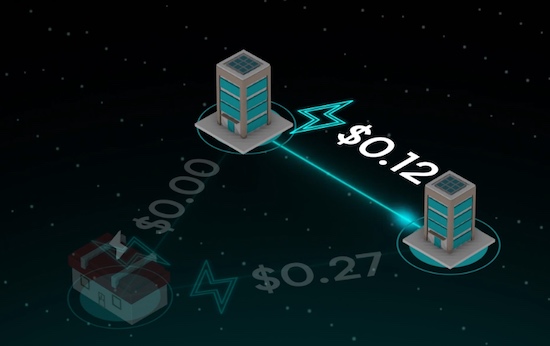
A peer-to-peer energy sharing trial will trade rooftop solar power between a swimming pool, a medical centre, a bakery, two agricultural machinery dealerships and five other commercial and local government enterprises in the Western Australia’s Wheatbelt region.
The P2P trial was launched on Tuesday by Perth-based company Power Ledger, whose block-chain based software platform allows customers to sell excess solar generated by their rooftop system directly with other parties for a better price than power from the grid.
So far, the technology has been applied in metropolitan settings, for solar trading between households. This project, which spans businesses across the Shires of Wongan-Ballidu and Moora, is both the first regional application of the technology, and its first commercial outing.
The project, in partnership with Innovations Central Midlands WA Inc, BSC Solar, Sonnen and CleanTech Energy, will trial Power Ledger’s energy trading platform at nine commercial sites in the Shire of Wongan-Ballidu, and one site from the Shire of Moora.
These include shire offices, a council-run Visitor Centre, a swimming pool, a medical centre, a sports centre, a local farmer, a mulch company, a bakery and two agricultural machinery dealerships.
Power Ledger managing director and co-founder David Martin said the software would improve the efficiency and economy of energy supply to businesses, while offering them a financial return for excess solar power – a feed-in tariff is not currently offered to solar businesses in that area.
“Some of the buildings in the trial have solar panels on their roofs, but they don’t have very much energy demand. A swimming pool in the middle of winter doesn’t have a lot of electricity demand, so typically that electricity would just get spilled to the grid,” Martin said.
“Through the trial we can demonstrate the the energy that’s being generated on the Shire’s roof is actually being used in another of the Shire’s buildings. So we can create a direct transfer of that energy, or of the value of that energy, between the Shire’s two buildings.
“If we want a fundamentally different outcome from our electricity supply, we’ve got to try a fundamentally different approach,” Martin added.
So this model of encouraging distributed generation in regional parts of the state, supplying electricity directly to regional consumers, reduces the cost of energy, reduces the carbon content of energy, and it adds economic development to regional Western Australia.
“If successful, which we believe it will be, this could revolutionise the way rural energy systems operate,” he said.
Already, the company is running several metropolitan projects, the latest being a 100 per cent renewable residential development of 36 townhouses outside Fremantle, featuring solar homes, a microgrid supply network for water and power and a shared on-site 670kWh battery.
Beyond Western Australia, Power Ledger also has active projects in cities around the world including Austria, Thailand, Japan and the United States.
Wongan-Ballidu Shire said it was drawn to the P2P trading platform as an opportunity to bring value to its residents and incentivise businesses to contribute more to the local economy.
“Sustainability and energy efficiency is vitally important in rural areas where communities truly understand the need to be self-sufficient,” said Stuart Taylor, Shire of Wongan-Ballidu CEO.
“This allows us to use the grid more efficiently and reduce the cost of energy for everyone – this is a major upside to our residents.
Innovation Central Midlands CEO Steve Mason said he expected the trial to improve economic and social development outcomes in the region.
“There’s plenty of sunlight in the bush that is just going to waste, or is getting fed back to the grid for nothing,” he said.
“With Power Ledger’s platform we’re seeing some compensation to the Shire of Wongan-Ballidu and businesses that have invested in solar technology.
“Given the vast number of businesses that support the agricultural industry and the houses, sheds and equipment used by farmers in their day to day operations (with all requiring significant amounts of power), this platform has the potential to save us thousands of dollars in electricity costs.”

Sophie is editor of One Step Off The Grid and deputy editor of its sister site, Renew Economy. Sophie has been writing about clean energy for more than a decade.


